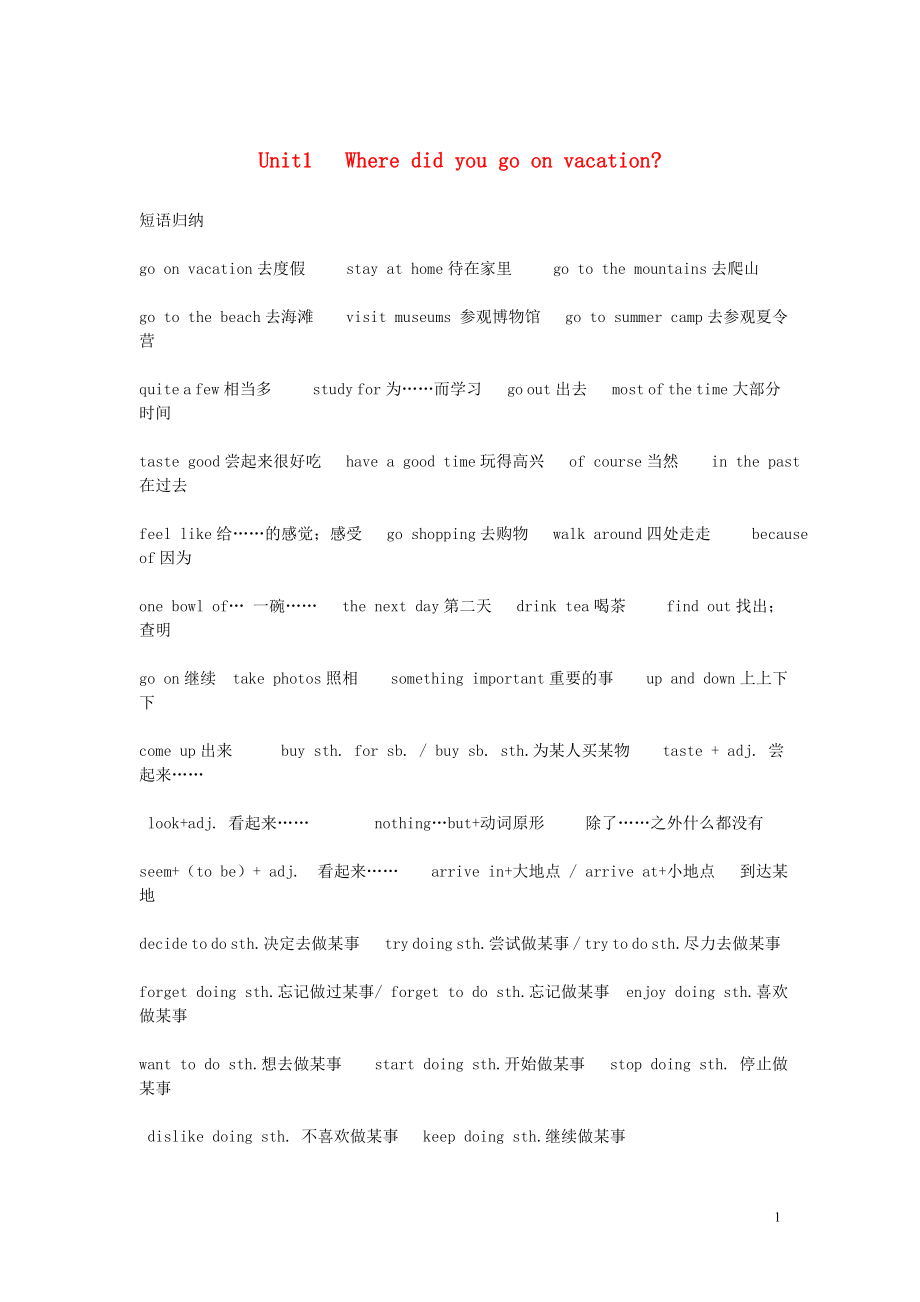《2019年八年級英語上冊 Unit 1 Where did you go on vacation知識點總結(jié) (新版)人教新目標版》由會員分享���,可在線閱讀����,更多相關(guān)《2019年八年級英語上冊 Unit 1 Where did you go on vacation知識點總結(jié) (新版)人教新目標版(5頁珍藏版)》請在裝配圖網(wǎng)上搜索�。
1、Unit1 Where did you go on vacation?
短語歸納
go on vacation去度假 stay at home待在家里 go to the mountains去爬山
go to the beach去海灘 visit museums 參觀博物館 go to summer camp去參觀夏令營
quite a few相當多 study for為……而學(xué)習(xí) go out出去 most of the time大部分時間
taste good嘗起來很好吃 have a good time玩得高興 of cou
2����、rse當然 in the past在過去
feel like給……的感覺;感受 go shopping去購物 walk around四處走走 because of因為
one bowl of… 一碗…… the next day第二天 drink tea喝茶 find out找出����;查明
go on繼續(xù) take photos照相 something important重要的事 up and down上上下下
come up出來 buy sth. for sb. / buy sb. sth.為某人買某物 t
3、aste + adj. 嘗起來……
look+adj. 看起來…… nothing…but+動詞原形 除了……之外什么都沒有
seem+(to be)+ adj. 看起來…… arrive in+大地點 / arrive at+小地點 到達某地
decide to do sth.決定去做某事 try doing sth.嘗試做某事 / try to do sth.盡力去做某事
forget doing sth.忘記做過某事/ forget to do sth.忘記做某事 enjoy doing sth.喜歡做某事
want to
4���、 do sth.想去做某事 start doing sth.開始做某事 stop doing sth. 停止做某事
dislike doing sth. 不喜歡做某事 keep doing sth.繼續(xù)做某事
Why not do. sth.?為什么不做……呢����? so+adj.+that+從句 如此……以至于……
tell sb. (not) to do sth. 告訴某人(不要)做某事
語法講解
1. go on vacation 度假 vacation相當于holiday�����,但vacation表示長的假期。
4. something interes
5���、ting有趣的東西
1)something�����,anything,nothing�����,everything是指物的不定代詞����。
somebody,someone�,anybody,anyone��,nobody�,everybody,everyone是指人的不定代詞���。
somewhere�,anywhere��,nowhere����,everywhere是指地點的不定代詞。
2)當形容詞修飾不定代詞����、不定副詞時,放于其后��; something special; somewhere wonderful.
3)不定代詞���、不定副詞做主語時��,謂語動詞用第三人稱單數(shù)�����。如:Is everybody here? 大家都到齊了嗎
6���、�?
4)something����,somebody����,someone,somewhere用于肯定句及表示請求或建議的疑問句中anything�,anybody,anyone�����,anywhere用于否定句���、疑問句及條件狀語從句中�����。如:
Did you do anything interesting? 你做了有趣的事嗎�?(表疑問)
Why don’t you visit someone with me? 你為什么不跟我一起去拜訪下某個人呢?(表建議)
If anything happens, please tell me. 如果有事情發(fā)生�,請告訴我。
6.buy sth. for sb. 或 bu
7��、y sb. sth 如: buy some books for me. = buy me some books.
7.提建議的句子: 8. ride bicycles 騎自行車
①What/ how about +doing sth.? 如:What/ How about going shopping?
②Why don’t you + do sth.? 如:Why don’t you go shopping?
③Why not + do sth. ? 如:Why not go shopping?
④Le
8����、t’s + do sth. 如: Let’s go shopping
⑤Shall we/ I + do sth.? 如:Shall we/ I go shopping?
13. 辨析: get to/reach/arrive 都是“到達“的意思
get to+地點=reach+地點= arrive at+地點(小)=arrive in+地點(大)
注意:若他們后面要加地點副詞here, there, home等����,則不需要加介詞。
14.nothing...but...意為“除......之外���; 只有”�����,如:
I ha
9���、ve nothing to do but watch TV all day long. 我整天除了看電視什么也沒干。
15. feel like 意為:“感受到;摸起來”����,后跟賓語從句或名詞。如:
I felt like I was a bird. 我感覺我是一只鳥��。
另外���,構(gòu)成短語 feel like doing sth.意為“想做某事”���。如:I feel like eating.我想吃東西。
16. enjoy doing sth . 喜歡做…;樂意做…
enjoy oneself 過得愉快 =have fun/have a good time.
19. I wond
10���、er what life was like here in the past. 我想知道過去這里的生活是什么樣的
(n): 奇跡���;令人驚訝的事情 如:No wonder! 難怪�����;不足為奇�!
(v) 驚訝 如:wonder at sth. ; wonder to do sth.
感到疑惑;想知道 如:I wonder where they are going.
20. few與little 的區(qū)別:
肯定 否定 許多
可數(shù) a few Few quite a few/not a few
不可數(shù) a little Little quite a litt
11���、le/ not a little
如:There is little sugar in the bottle. Can you get some?
Still no one seemed to be bored. 仍然沒有人感到煩悶�����。
1)seem意為“好像�;似乎�;看來”�����,是個連系動詞���,構(gòu)成的短語有:
seem to do sth. 好像做某事 如: They seem to wait for you.. 他們似乎在等你��。
seem(to be)+adj. 似乎...... 如: He seemed ( to be) ill yesterday. 昨天他似乎病了。
It seem
12�、s that + 從句 似乎...... 如: It seems that he was ill yesterday. 昨天他似乎病了���。
其他表示狀態(tài)的系動詞有:feel(覺得); keep(保持);stay(保持);look(看來像...);
smell(聞起來)sound(聽起來……)taste(嘗起來……)
2) bored (adj)�,意為“感到厭倦的����、無聊的”,其主語是某人;
boring(adj)����,意為“令人厭倦的、無聊的”其主語是某物�。 如:
I got bored with the boring work. 我對這無聊的工作感到厭倦。
相類似的詞語還有
int
13�����、erested/ tired/ excited/ amazed/surprised
interesting/ tiring/ exciting/ amazing/surprising
22. decide(v)決定 decide to (not) do sth. = make a decision (not) to do sth.
decision(n) decide on doing sth. 決定做某事
如:Li Lei has decided to go to Beijing . 李雷已經(jīng)決定去北京。
23. Because of the bad weat
14、her, we couldn’t see anything below.
1) because of + 名詞/代詞/名短 I had to move because of my job. 因為工作的原因
because + 從句 如:I do it because I like it. 我做這件事是因為我喜歡�����。
2)below意為“在......下面;低于”�,其反義詞為 above,意為“在......上面�����;高于”
24. 形容詞/副詞+enough 如:wet/quietly enough 足夠漂亮
enough enough +名詞 如:enough umbr
15�、ellas 足夠的雨傘
足夠 (形/副)+enough+ (名) to do sth. 足夠…去做…
如:I have enough money to go to Beijing. 我有足夠的錢去北京。
She is not old enough to go to school. 她年齡不夠�,不能去上學(xué)。
同義句: She is too young to go to school. (too… to… :太… 而不能…)
She is so young that she can’t go to school.
25. so+形
16����、/副+that 從句:She is so popular that everyone likes her.
such such+名短+ that 從句:She is such a popular girl that...
so that 從句:結(jié)果…(為了) 如:He gets up early so that he can catch the early bus.
26. 反身代詞:myself/yourself/itself/herself/himself/ourselves/yourselves/themselves
如:The child (herself
17���、) usually wears the clothes (herself).
27.What a difference a day makes! 一天的差異多大?��。ake a difference in…:對…有影響
1. What a/an + adj.+ n(單)+主+謂�!或 What + adj. +n(復(fù)不)+主+謂!
2. How+ adj. +主+謂(聯(lián)系動詞)�!或 How + adv+主+謂(實義動詞)!
28. I just stayed at homemost of the time to read and relax.
5
 2019年八年級英語上冊 Unit 1 Where did you go on vacation知識點總結(jié) (新版)人教新目標版
2019年八年級英語上冊 Unit 1 Where did you go on vacation知識點總結(jié) (新版)人教新目標版

